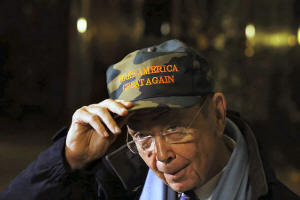|
Trump packs trade team with veterans of
steel wars with China
 Send a link to a friend
Send a link to a friend
 [December 10, 2016]
By David Lawder [December 10, 2016]
By David Lawder
WASHINGTON (Reuters) - President-elect
Donald Trump is stacking his trade transition team with veterans of the
U.S. steel industry's battles with China, signaling a potentially more
aggressive approach to U.S. complaints of unfair Chinese subsidies for
its exports and barriers to imports.
Led by Wilbur Ross, a billionaire steel investor and Trump's nominee for
commerce secretary, Dan DiMicco, the former CEO of steelmaker Nucor
Corp, and three veteran steel trade lawyers, the team is expected to
help shift the U.S. trade focus more heavily toward enforcement actions
aimed at bringing down a chronic U.S. trade deficit, Washington trade
experts said.
Based on their past efforts, this could include more challenges to
China's trade practices through the World Trade Organization and more
U.S. government-initiated anti-dumping and anti-subsidy cases against a
wider range of Chinese products. The latter would be argued before the
U.S. International Trade Commission - a forum where the steel industry
has had considerable success.
Ross, DiMicco and other leaders of Big Steel have been on the front-line
in U.S. trade battles against the world's export superpower.
Hit by a flood of cheap imports from China and other countries, the U.S.
steel industry has brought 16 new cases in the past three years, seeking
punitive duties from the Commerce Department to combat below-cost
dumping and unfair subsidies that slashed prices of various steel
products to historic lows last year, causing layoffs at U.S. steel
mills. (See graphic http://tmsnrt.rs/2gUFGAf)

Some of these cases have resulted in massive penalties against Chinese
imports, including duties of more than 500 percent on Chinese
cold-rolled steel used in autos and appliances.
Lawyers Robert Lighthizer and Jeffrey Gerrish have represented United
States Steel and Stephen Vaughn has represented AK Steel in these cases.
The three are also part of Trump's trade team.
Lighthizer, Gerrish, Vaughn, Ross and DiMicco either declined to comment
for this story or did not respond to Reuters' requests for interviews.
Trade experts familiar with their views and their history of
confrontation with China, however, say they will not be afraid to push
the limits of what is legal under World Trade Organization rules in
defense of U.S. trade interests.
Lighthizer, who along with DiMicco is considered a strong candidate to
be the new U.S. Trade Representative, is known for his work during the
Reagan administration pressuring Japan into voluntary export restraints.
PUSHING WTO LIMITS
"Bob Lighthizer is very smart, very strategic and totally fearless,"
said a Washington attorney who has worked with him for three decades and
asked not to be named because Trump's USTR selection process was still
under way. "If he's in charge you can expect him to use every tool
available to create leverage to get China and anyone else to stop the
cheating. He is no fan of the WTO."
Lighthizer told a congressional panel in 2010 that the WTO's dispute
resolution system was ineffective and that the United States "should
consider aggressive interpretations of WTO provisions that might help us
deal with Chinese mercantilism."
Such tactics could include imposing temporary import quotas and
surcharges and factoring in the effect of currency manipulation into
U.S. anti-dumping duties, he said.
Ross, who advised Trump's presidential campaign on economic issues, has
signaled he will use access to the lucrative U.S. consumer market as
leverage to negotiate better trade terms. The United States is China's
biggest export market.
[to top of second column] |

Billionaire investor Wilbur Ross. REUTERS/Lucas Jackson

During his presidential campaign, Trump vowed to levy a punitive
45-percent tariff on Chinese goods and label Beijing a currency
manipulator. It is not clear though whether he will follow through on
those threats once he takes office.
Ross told CNN last week that Trump will not be "willy nilly slapping a
45 percent tariff on everything," but will maintain the threat of
tariffs as part of negotiations.
In an emailed statement to Reuters, Ross said he would divest "all
holdings and board seats that pose conflicts" but declined to answer
other questions on his plans for Trump's trade policy and engagement
with China.
The personal blog of DiMicco, meanwhile, gives some indication of how he
would approach China if he was named head of USTR. He has accused China
of waging a "mercantilist trade war" on the United States for two
decades, through currency manipulation, unfair subsidies and
intellectual property theft.
On the issue of currency manipulation, many economists disagree, saying
Beijing is no longer keeping its yuan artificially undervalued to make
its exports cheap, citing the hundreds of billions of dollars in
reserves it has spent to prop up the yuan's value this year.
A key question for Trump's trade team is how far they can push China to
change its trade practices without provoking a trade war that will hurt
both countries.
"If what they plan to do is get a little scratchier with China on
enforcement within the existing WTO rules, that's OK," said Scott
Miller, a China trade expert at the Center for Strategic and
International Studies in Washington. "But if they go outside those
guardrails, it will be unpleasant because that will draw retaliation."
He Weiwen, vice president at the Center for China and Globalization, a
government-affiliated think-tank in Beijing, said any punitive action
against China by the Trump administration would invite a retaliatory
response.
"We will certainly respond in the same way," he said, adding that
Washington and Beijing "should find good solutions that are acceptable
to both and not go to extremes. It will hurt both."


Chinese state media have warned that any new tariffs imposed by Trump
would lead to retaliation against Boeing aircraft, Apple iPhones and
U.S. corn and soybeans.
(Additional reporting by Michael Martina in Beijing; Editing by David
Chance and Ross Colvin)
[© 2016 Thomson Reuters. All rights
reserved.]
Copyright 2016 Reuters. All rights reserved. This material may not be published,
broadcast, rewritten or redistributed. |